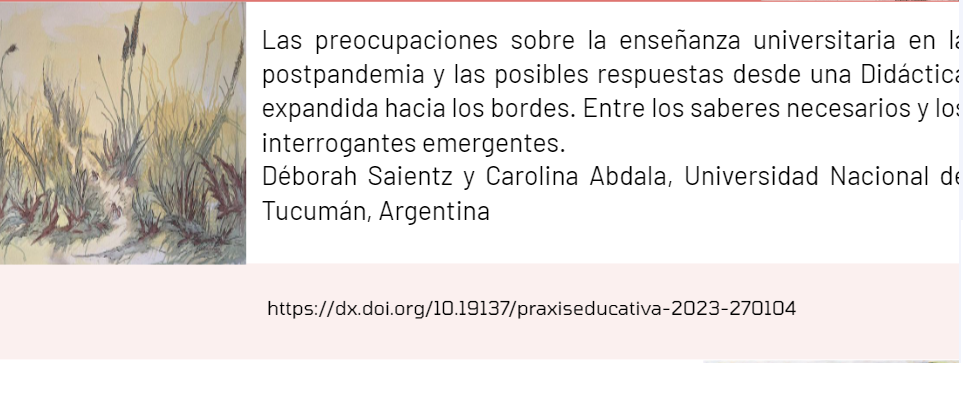Concerns about university teaching in the post-pandemic and possible responses from a Didactics expanded to the edges. Between the necessary knowledge and the emerging questions
DOI:
https://doi.org/10.19137/praxiseducativa-2023-270104Keywords:
Teaching – University – Didactics – Teachers- Post-pandemic -Abstract
In this paper we present our reflections from the development of a postgraduate course on teaching practices at the university, in which the contributions of the attending teachers evidenced the essential articulation of didactics with other fields of knowledge, in order to understand the problems that teaching raises in the present. Issues such as the relationship of teaching with technology, with the ways of learning of young people, affectivity as a component of teaching, attention to diversity and the working conditions of teachers are presented as topics recurring, which although they are not new, have acquired other connotations that make them more complex. This made us think in the sense of considering a "didactics from or towards the edges", focusing on the contributions of those other fields to this discipline that offer greater richness to the analysis of teaching.
Downloads
References
Abramowski, A. (2010) Maneras de querer. Los afectos docentes en las relaciones pedagógicas. Editorial Paidós. Cuestiones de Educación.
Abdala, C. (2020). La Universidad Nacional de Tucumán frente al coronavirus: problemas, adecuaciones y desafíos de la universidad pública en un escenario inédito. En P. Falcón (Comp.), La universidad entre la crisis y la oportunidad: reflexiones y acciones del sistema universitario argentino ante la pandemia. Editorial de la Universidad Nacional de Córdoba.
Abdala, N. C., Barros, M. E. y Saientz, D. (2018). Presencias y ausencias en la enseñanza de la didáctica general en la formación de profesores de la Universidad Nacional de Tucumán. Revista de Educación, Número 14.. pp. 169- 186 https://fh.mdp.edu.ar/revistas/index.php/r_educ/article/view/3046/2945
Abdala, N. C. y Saientz, D. (2021). Clase 1: “Estudiar en la universidad mientras dura la pandemia: el impacto de los nuevos escenarios de enseñanza en las trayectorias de las y los estudiantes”. Ciclo de Formación de Postgrado II “Evaluación Formativa para la mejora de los Aprendizajes. Recrear sentidos y prácticas en Entornos Combinados”. Secretaría Académica. Coordinación de Posgrado y Asuntos Académicos. Universidad Nacional de Salta.
Alvarez Mendez, J. M. (1982). Las ciencias de la educación en el contexto interdisciplinar: una justificación epistemológica (Notas para un ensayo explicativo del currículo universitario). Revista Española de Pedagogía, XL(155). https://revistadepedagogia.org/xl/no-155/las-ciencias-de-la-educacion-en-el-contexto-interdisciplinar-una-justificacion-epistemologica-notas-para-un-ensayo-explicativo-del-curriculo-universitario/101400048134/
Barbosa Moreira, A. F. (1999). Didáctica y curriculum: cuestionando fronteras. Propuesta Educativa. Novedades Educativas, 10(20), 24-30.
Camilloni, A. (1996). De herencias, deudas y legados. Una introducción a las corrientes actuales de la didáctica. En A. Camilloni, M. C. Davini, G. Edelstein, E. Litwin, M. Souto y S. Barco, Corrientes didácticas contemporáneas (pp. 17-39). Paidós.
Caparrós Martín, E., Quiles-Fernández, E. y Arbiol I Gonzalez, C. (2020). De la universidad del derecho y la calidad hacia una universidad del cuidado. Revista Argonautas, 10(15), 31-45. http://fchportaldigital.unsl.edu.ar/index.php/ARGO/inde
Feito, R., Cabrera, L. y Beltrán, J. (2022). La Sociología de la Educación en España. Cronología de una época: 1990-2021. Revista de Sociología de la Educación-RASE, 15(1), 70-94. http://dx.doi.org/10.7203/RASE.15.1.22180
Juarroz, R. (1958) Poesía Vertical. Ed. Catedral
Maggio, M. (2021). Enseñar en la universidad. Pandemia… y después. Integración y conocimiento, 10(2), 203-217. https://revistas.unc.edu.ar/index.php/integracionyconocimiento/article/view/34097
Magendzo, A. (2016). Incorporando la perspectiva controversial en el currículum disciplinario. Revista iberoamericana de educación superior, 7(19), 118-130. http://www.scielo.org.mx/scielo.php?script=sci_arttext&pid=S2007-28722016000200118&lng=es&tlng=es.
Miranda, M. y Van Nieuwenhove, C. (2022). El desafío de migrar el aula y los laboratorios a la pantalla mediante recursos y herramientas tecnológicas, en el marco de un nuevo contexto educativo. En C. Abdala y L. Torres Auad (Comp.), Voces que entraman experiencias en el contexto de pandemia. Universidad Nacional de Tucumán.
Pulido Aybar, A. (2022). Danza, currículum y los cambios a raíz de la pandemia. En C. Abdala y L. Torres Auad (Comp.), Voces que entraman experiencias en el contexto de pandemia. Universidad Nacional de Tucumán.
Torres, R. M. (2008). Prefacio. En P. Freire, Cartas a quien pretende enseñar. Siglo XXI.
Walker, V. (2020). Notas sobre la experiencia universitaria en tiempos de pandemia: sentidos, relaciones y condiciones de trabajo y estudio. Argonautas, Revista de Educación y Ciencias Sociales, 10(15). Departamento de Educación y Formación Docente, Facultad de Ciencias Humanas de la Universidad Nacional de San Luis. http:// fchportaldigital.unsl.edu.ar/index.php/ARGO/article/view/275

Published
Issue
Section
License
Copyright Notice
Editorial Committee Educational Praxis Magazine:
I hereby declare that I am the author of the article titled (article name), that it is original and my own and that it was not previously published in any other format or medium. I declare to know that the magazine will not charge me any type of fee under any circumstances, nor will I receive any type of monetary compensation If it were accepted for publication in Educational Praxis, I authorize the aforementioned magazine to publish it digitally and to advertise it on its social networks.
If the work is published, I adhere to the Creative Commons license called "Attribution - Non-Commercial Share Alike CC BY-NC-SA", through which it is allowed to copy, reproduce, distribute, publicly communicate the work and generate derivative works, as long as when the original author is cited and acknowledged. This license has been used since September 2018. In 2016 CC BY NC ND 4.0 was adhered to; and in the years 2017 and 2018 (January-August) CC BY NC 4.0.
This CC BY-NC-SA Share Alike license does not, however, permit commercial use of the work. As an author, the journal may establish additional agreements for the non-exclusive distribution of the version of the work published in the journal, it allows me to self-archive the published articles, in their post-print version, in institutional, thematic repositories, personal web pages or any other relevant use. with the recognition of having been first published in this journal.
Educational Praxis adheres to DORA (Declaration on Research Assessment) signed in San Francisco, California, on December 16, 2012, and to the Declaration of Mexico (Joint Declaration LATINDEX - REDALYC - CLACSO - IBICT).














_(1)2.png)


3.png)











_(2).png)






2.jpg)









